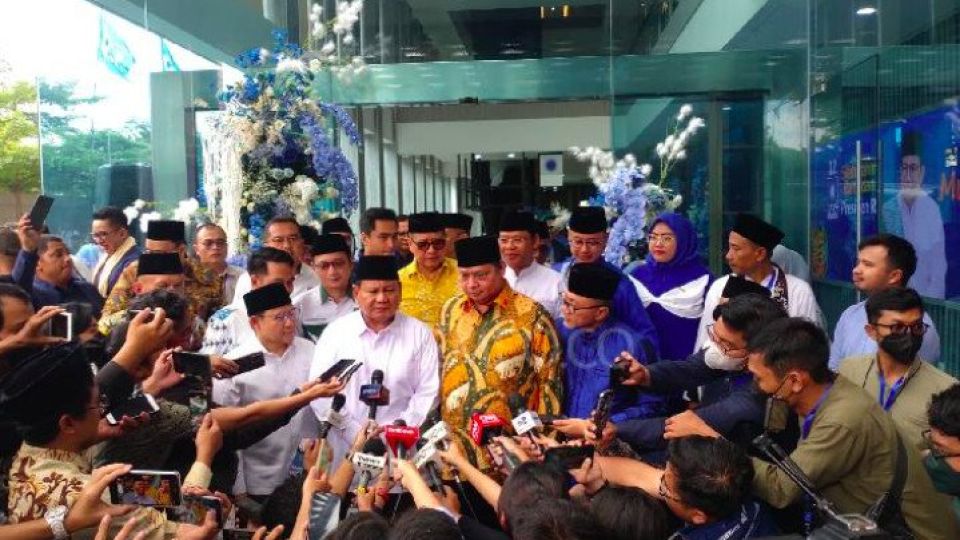April 10, 2023
JAKARTA – Gerindra Party chief and presidential hopeful Prabowo Subianto is getting more support from prospective allies who seek to join the proposed grand alliance to ensure the continuity of President Joko “Jokowi” Widodo’s flagship programs.
The idea of stitching a big-tent alliance to back a pro-Jokowi government presidential candidate in 2024 has drawn in more support as parties from the non-parliamentary bloc scrambled to have a sit down with Prabowo, the only presidential frontrunner from the alliance and one of the contenders some believe to have been tacitly endorsed by the President.
United Indonesia Party (Perindo) chairman Hary Tanoesoedibjo was the first to be hosted by the retired general at his private residence in Kertanegara, South Jakarta, on last Wednesday.
The one-and-a-half-hour closed-door meeting ended with the media tycoon welcoming Prabowo’s offer to join the potential pro-Jokowi government front alliance and agreeing to “continue discussion” in hopes that “cooperation will run smoothly for the national interests”.
Crescent Star Party (PBB) chief Yusril Ihza Mahendra made his bid the following day, saying it was open to the idea of joining the grand alliance as he described it as an “ideal” and a manifestation of a “democracy that is unique to Indonesia, which is based on brotherhood, teamwork and mutual cooperation”.
The Indonesian Solidarity Party (PSI), which has thrown its support behind popular Central Java Governor Ganjar Pranowo of the ruling Indonesian Democratic Party of Struggle (PDI-P), had also announced its intention to join the pro-Jokowi government alliance last week, saying it wanted to partner “with those who have the same vision as Jokowi”.
The party, however, insisted it still supported Ganjar and declined to speculate whether the alliance would nominate Prabowo as its presidential candidate.
Pro-government parties announced last week they considered merging the Golkar-led United Indonesia Coalition (KIB) and the Gerindra-led Great Indonesia Awakening Coalition (KKIR), both of which had yet to name their presidential nominee.
The amalgamation would comprise five of seven pro-government parties currently supporting President Jokowi, Golkar, Gerindra, the United Development Party (PPP), the National Mandate Party (PAN) and the National Awakening Party (PKB), potentially isolating the ruling PDI-P, which has yet to name its nominee despite having enough legislative seats to field a candidate on its own.
‘Middle way’
Major pro-government parties initiating the big-tent alliance plan to intensify talks in the coming months as they seek to break a political stalemate when it comes to nominating presidential candidates.
After his meeting with Prabowo on Saturday, KIB’s National Mandate Party (PAN) chairman Zulkifli Hassan, a close ally of President Jokowi, claimed the formation of the grand alliance was “under the command [and] orchestration of [Mr.] Jokowi and he was ready to do anything, going here and there, to knit the alliance together so a solid front of the ‘middle way’ can become a reality”.
Both Zulkifli and Prabowo described the pro-Jokowi grand alliance as a “middle way” that would bridge various interests and provide a peaceful transition of power. “Everybody must win,” Prabowo said. “I’m sure that in the coming months, we will be tired […]. We will continue to hold meetings and this is our job as party leaders; we are the ones who have to be tired of finding a format so the people can experience a transition [of power] peacefully.”
Gerindra secretary-general Ahmad Muzani stressed a growing need for a figure who could carve a middle way and cast Prabowo as that figure while noting talks with other parties, including the PDI-P, were still underway.
“Jokowi seemed to be still trying to formulate a political arrangement to compensate each party joining the grand alliance and willing to carry out his legacy,” Agung Baskoro, political analyst of Trias Strategis Politika, said.
“If he manages to do that in a way that makes everyone, including PDI-P, content, the bloc could easily win the presidential race just in one round by pairing Ganjar and Prabowo,” he said. “But if he fails, there is also still a possibility parties will jump ship and join PDI-P if it announces Ganjar as the party’s presidential nominee.”
‘New balance point’
However, while the alliance said it would open doors for the ruling PDI-P to join them, the ruling coalition members appeared to express a desire to challenge the ruling PDI-P, whether they would end up on the opposite side or in the same camp.
Speaking in a ProJo event on Saturday, Golkar chairman Airlangga Hartarto took what many believe as a swipe at PDI-P, saying, “The era is moving ahead from red to yellow,” referring to the party’s distinctive color.
Political analyst of Paramadina University Ahmad Khoirul Umam described the exclusion of PDI-P in the grand alliance as indicative of tense undercurrents and resistance by ruling coalition members to engage in a political pact with PDI-P, given its dominance over the last 10 years.
“This perception of PDI-P’s domination of the power distribution naturally gave rise to efforts by other ruling coalition members to seek a new balance,” Umam said.
“The grand alliance initiative can be seen as a political strategy to put PDI-P in the corner to hand over its golden ticket to mainstream pro-government parties,” he added.
The ruling party said it may join the grand alliance as long as it was willing to endorse its member as the presidential candidate. (ahw)


